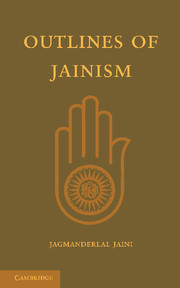INTRODUCTION AND HISTORY
Published online by Cambridge University Press: 05 June 2016
Summary
Two facts stand at the basis of all philosophy and science. One of these is Man; the other, the Universe. All speculation attempts to answer the question : What is the relationship that exists between Man and the Universe? All practical wisdom tries to solve the problem : In the light of such relationship what is the best mode of living for man? All religions and all systems of ethics and metaphysics are attempts, more or less successful, to deal with the various aspects of the above two questions.
The object of these pages is to try to reconstruct the answer which in India Lords Parsvanatha and Mahavira gave to these questions in the eighth and sixth centuries B.C. respectively. The work has no very great antiquarian pretensions. It seeks rather to expound the main features of an ancient creed which still retains the allegiance of an important section of the Indian people.
A word as to the plan of the Outlines. The contents may seem to be almost presumptuously encyclopaedic. But the all-comprehensive nature of the questions makes it imperative to cast if only one glance upon the various points of view from which men and matters are looked at by the different sciences — practical and speculative.
The subject might be divided into two parts: Part I: Religion ; Part II : Secular Knowledge, e.g., Logic; Mathematics; Science, including Cosmogony, Cosmology, Astronomy, Astrology, Palmistry, etc., Chemistry, etc., Medicine, Occult Sciences, Arts and Practical Sciences; Law ; Language; and Grammar. But the Outlines deal systematically only with Part I ; the second part is just touched in the Appendices.
PART I. RELIGION
The word “religion” is here used in the sense of its popular synonym “ creed ”, one's set of beliefs. As soon as man begins to think, he consciously or unconsciously asks himself certain questions about himself, about the universe, about his destination, and about his duties. Equally consciously or unconsciously he answers his questions, in a lucid or indistinct, in a partial or thorough; in a cogent or unconvincing manner. These sets of answers are his religion
- Type
- Chapter
- Information
- Outlines of Jainism , pp. xix - xlPublisher: Cambridge University PressPrint publication year: 2013



